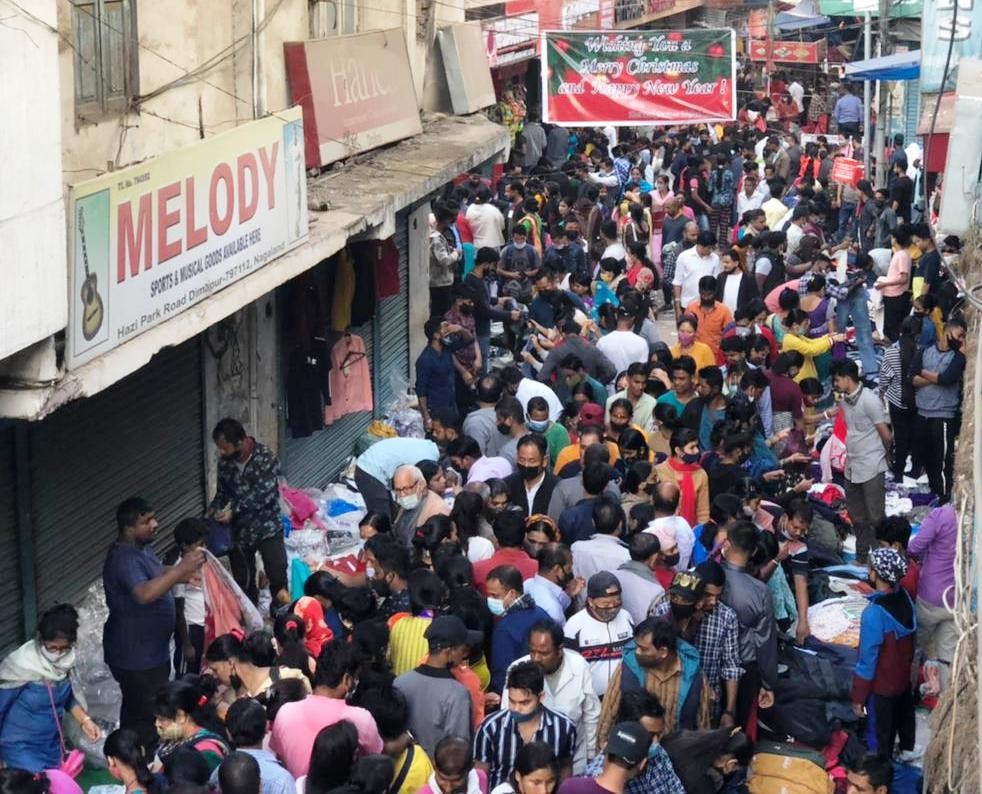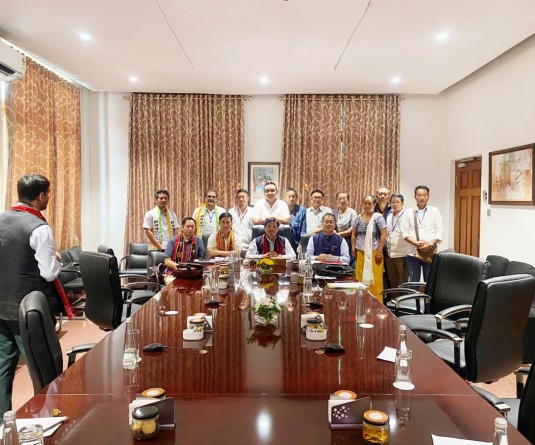With Christmas Day fast approaching, popular shopping areas like the Hazi Park Road in Hong Kong Market were seen crowded with shoppers, many without masks, with no scope for social distancing in the cramped space. (Morung File Photo)

Advises enhancement of public health & social measures
Morung Express News
Kohima | December 22
The state Department of Health and Family Welfare on Wednesday issued a press statement on various public health and social measures with regard to the Omicron variant of concern and urged citizens to responsibly celebrate the festive season.
While no cases of variant B.1.1.529, labelled as a variant of concern on and given the name Omicron by the World Health Organization on November 26, have been reported from Nagaland so far, as on December 16, Omicron has been reported from all 6 WHO Regions and over 89 countries (WHO) including many States in India, it said.
Citing data from the WHO, the health department informed that Omicron is a highly divergent variant with around 26-32 mutations in the spike protein with potential for immune escape and higher transmissibility.
While evidence available around Omicron is still preliminary and more data and research is needed for the same, the health department detailed some of its effects on factors like transmissibility, disease severity, among others.
Transmissibility and severity
The health department, citing the Union Ministry of Health and Family Welfare and WHO, informed that Omicron is at least 3 times more transmissible than the Delta variant of concern and has substantial growth advantage over Delta. It said that in countries with community transmission by Omicron, doubling time is between 1.5-3 days and is spreading rapidly even in countries with high level of population immunity. Referring to a study conducted in the United Kingdom, it also noted that there is a “Secondary attack rate of 21.6% as compared to 10.7 % by Delta.”
In terms of severity of cases, it said that data on clinical severity is still evolving as there is a time lag between increase in cases and hospitalizations or deaths. However, in the UK and South Africa which are the two countries most affected by Omicron, hospitalizations continue to rise daily.
“’It is too early to conclude if Omicron is more or less severe than other VOCs. However, early data suggest that the severity may be potentially lower than for the Delta variant and even if this is the case, it is expected that hospitalizations will increase as a result of significant increases in transmission. More hospitalizations will put a burden on health systems and lead to more deaths, particularly with short doubling,” it said, quoting WHO.
Diagnostics, vaccination & treatment
According to the release, available RT PCR kits and Rapid Antigen tests are effective in detecting Omicron as per available evidence and further genomic sequencing will be followed up as necessary.
Based on studies in the UK and South Africa, it said that re-infection by Omicron appears to be higher than with other VOCs
It said that as per WHO, two doses of available vaccines appear to have reduced effectiveness against omicron on infection, symptomatic disease, and hospitalization. Preliminary data for the Pfizer BioNTech-Comirnaty vaccine from South Africa reported vaccine effectiveness of 33% against infection and 70% against hospitalization, it said.
With regard to the Omicron’s impact on available treatments and therapeutics, it said that Corticosteroids and IL-6 blockers are expected to remain effective.
“Preliminary in vitro data published in preprints suggests that some of the monoclonal antibodies developed against SARS-CoV-2 may have decreased neutralization against Omicron,” it said, quoting WHO.
Public health and social measures
Based on early evidence, the department stated that all citizens should celebrate responsibly by limiting gatherings, crowd avoidance and adhering to responsible measures like use of mask and hand hygiene.
During the festive season, it recommended the use of well fitted masks, physical distancing, ventilation of indoor spaces, crowd avoidance and hand hygiene, which it said remain key to reducing transmission of SARS-CoV-2, even in the context of emerging variants. However, public health and social measures (PHSMs) may need to be enhanced to further limit interpersonal contact, to control transmission with a more transmissible variant, it added.
Reiterating the importance of basic COVID appropriate behaviours especially in crowded areas, social or indoor gatherings, the department asserted that “One life is more worth than a postponed or cancelled event.”





